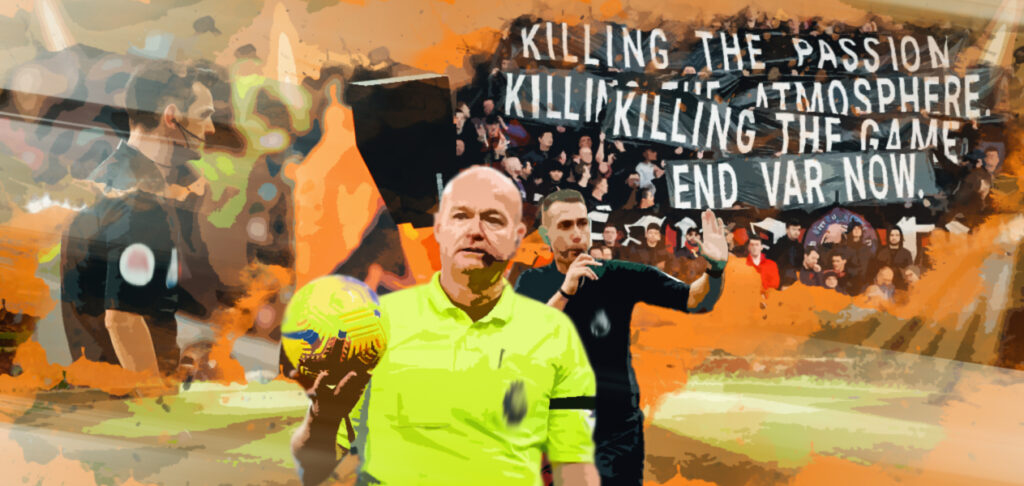VAR and the state of refereeing: What are we missing?
Technological interventions are inevitable. Ever since we managed to rub rocks together to make fire, technological solutions have increased and evolved to become an unmissable part of the human experience.
The world of football, much like any other sport and any other walk of life, has kept on increasing technological involvement in the game as per perceived convenience. Some of it has been good – the Goal-line technology has been a resounding success and accepted worldwide; the others, not so much.
You know where this is going: Video Assistant Referees or VARs. Introduced a few years ago to provide added technological support to on-field referees for crucial in-game decisions, VARs, by definition, have been doing their job efficiently. And yet, the football community is split in half over whether the whole thing actually helps the game. Why is that?
Let’s get the emotional argument out of the way, because this is something almost everyone agrees is getting negatively affected; for some, almost beyond reason. The way a player reacts when the ball goes in the net is not just a celebration of the goal itself, it’s the celebration of life, of emotions that make us human. More often than not we see players enjoying a moment after a goal, only to be told that their goal would be chalked off for reasons often underwhelming. Yes, this is a transition period and in time players growing up in the VAR era will learn to adjust with that, but those moments when a player has to bottle their emotions right when they’re at the cusp of exploding are, at times, saddening.

Another thing that does not gel well with VAR is the set of rules that govern football. The offside rule was introduced in late nineteenth century to prevent players from goal-hanging, not keeping in mind that centuries down the line people will be able to measure offsides in millimetres. The players are now flagged offside for margins so paltry that there’s no argument for advantage, rather the rule deems them offside almost just because, which begs the question – what even is the point?
The rulebook for anything requires timely reforms, but the introduction of VAR has shown clearly how antiquated the rules governing the modern game have become.
Also read: The Glazers and Manchester United – An overview
What also bothers many is the selective nature of scenarios in which VAR can operate. Of course, this is in place to make sure the flow of the game doesn’t get too much interruption, but it creates possibilities in which despite the availability of VAR a wrongfully given decision won’t be reversed.
Case in point, if a wrongfully given throw-in or corner results in a goal, VAR cannot overturn it. If a handball occurs some arbitrary number of passes before a goal is scored, then it may or may not be overturned (the translucent nature of the how and what of VAR is yet another issue). VAR can advocate overturning a wrongfully given red card, but not a yellow card, which down the line may translate in a suspension. These cases seemingly end up being loopholes in a pseudo-reality in which VAR cannot operate despite existing.
Talking of loopholes, consider the following example – a referee sees possible infringement in the 18-yard box but decides not to give the penalty, believing VAR will sort it out for them if it’s an obvious enough mistake. VAR looks at the incident and decides it’s not clear and obvious enough for them to ask the on-field ref to reconsider. On another day, with different referees, the same foul could precipitate into not only a penalty, but also a card. This mutually accepted dereliction of responsibility, compounded by the respective interpretations of two different individuals, has seen the grey area of fouls widen and become more nebulous. Any foul that falls between a 50-50 challenge and a clear-and-obvious referee mistake just goes unchecked.

Lastly, what the nascent VAR era has shown us, is that even the very best referees seem to be flummoxed about the laws that govern the game, often unable to do anything because they’re bound by the rulebook. Earlier in the season, we had a tweak to the handball rule in the Premier League that saw penalties given even if the ball grazed a player’s hand after hitting their head. Such was the uproar that this was quickly addressed, giving the referees a little more room to account for common sense.
Even then, there are cases of handballs and red-card fouls which the refs are mandated to accordingly penalise even when both the fouler and the fouled implore otherwise. The most common, and maybe the sanest argument we hear in these scenarios is from the ex-pros who have played the game at the very highest level, who keep insisting that there are a lot of fouls being given in situations in which a player could move no other way, and yet they are given because they look worse in the slow-motion footage referees are asked to look at when re-evaluating their decision. The idea of inviting former players as consultants for referees has been purported for quite a while, and given some of the decisions that are being given these days, I would not disagree to it.
Also read: José Mourinho is Rome-bound: Can he re-invent himself in Italy?
As far as I am concerned, VAR is here to stay, and I am not particularly against it. It was introduced after a need for more support to the referees was realised. What we are seeing now is that the rules governing the game have accelerated into antiquity, no longer viable to exist in their current form in the modern game. Sincere and continuous discussions need to be had to adapt these laws to fit the game they’re written to govern.
At the end of the day, this is what I would like to leave you with: to err is human. As long as humans are involved in the game, there will be errors at all levels every once in a while. Part of accepting VAR is accepting the possibility of mistakes. Similarly, with everyone having an opinion on everything, discussions and debates over every single foul throw and grazed handball will continue till the end of time, as they have since the birth of football.


